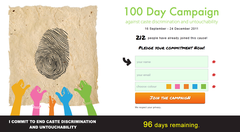“I commit to end caste-based discrimination and untouchability!” said UN High Commissioner for Human Rights, Navi Pillay, in her video message, kicking off the bold 100 day campaign launched by her office and the National Dalit Commission (NDC) in Nepal.

The High Commissioner is encouraging everyone to pledge their commitment to end caste discrimination* and untouchability and the campaign website is collecting pledges and turning them into colourful fingerprints symbolising all those who are against this atrocious type of discrimination.
The International Dalit Solidarity Network (IDSN) has been working to end caste discrimination for more than a decade and wholeheartedly welcomes this new campaign.
“The campaign is a fantastic initiative and we would like to encourage everyone to go to the website and register their commitment to help end one of the biggest human rights issues the world is facing today,” says IDSN Coordinator, Rikke Nöhrlind.
While the campaign is primarily focused on Nepal, IDSN would like to encourage the global community, Dalits and human rights defenders in other caste affected countries to take this opportunity to pledge their support to a cause that can help 260 million people affected by caste discrimination worldwide out of oppression.
IDSN would also like to encourage political leaders, business leaders and influential decision makers from across the globe to speak out against caste discrimination and to go to the campaign website and make their pledge to end caste discrimination.
The President of Nepal, Dr. Ram Baran Yadav, has led the way by inaugurating the campaign, giving his commitment and commenting that, “It is a matter of shame to know that people in the 21st century are still practising caste discrimination and untouchablility.”
The government of Nepal recently introduced Caste-based Discrimination and Untouchability (Offence and Punishment) Act, 2011. NDC and OHCHR partnered in 2008 to jointly advocate for the swift passage of the draft caste-based discrimination and untouchability bill and for its compliance with international standards.
“By taking this important step to end these practices, Nepal has become a leader on the world stage in the fight against caste-based discrimination,” said Ms. Pillay in her speech commending the role Nepal has taken in this global struggle.
Various awareness-raising programs like audio-visual activities, distribution of posters and pamphlets and interaction programs among others will be organised country-wide throughout the 100 days campaign till it comes to an end on 24 December 2011.
More Information:
Watch the video introduction by the UN High Commissioner for Human Rights
Download the High Commissioner’s statement as a PDF
Read the press release on the campaign from the OHCHR-Nepal and the NDC
Learn more about caste discrimination
* Caste discrimination subjects those at the bottom of the caste system, known as Dalits or ‘untouchables’, to horrific acts of repression and violence and forces them to live in apartheid style segregation from the rest of society, severely impairing equal rights in access to work, education and basic services such as water, sanitation and healthcare. There are 260 million Dalits globally, with the majority living in South Asia.
